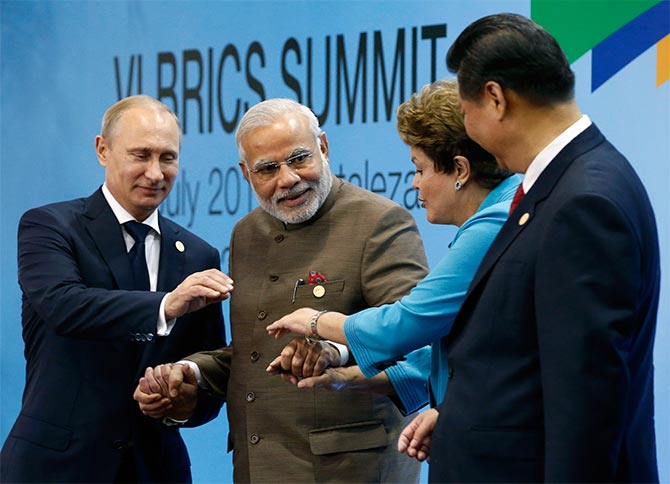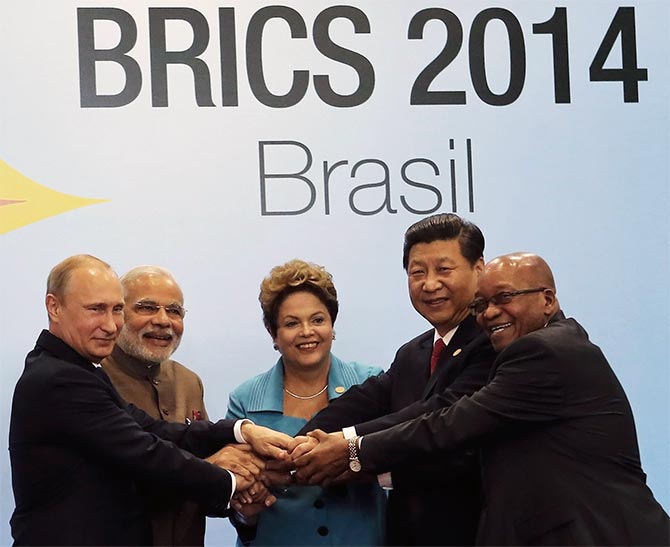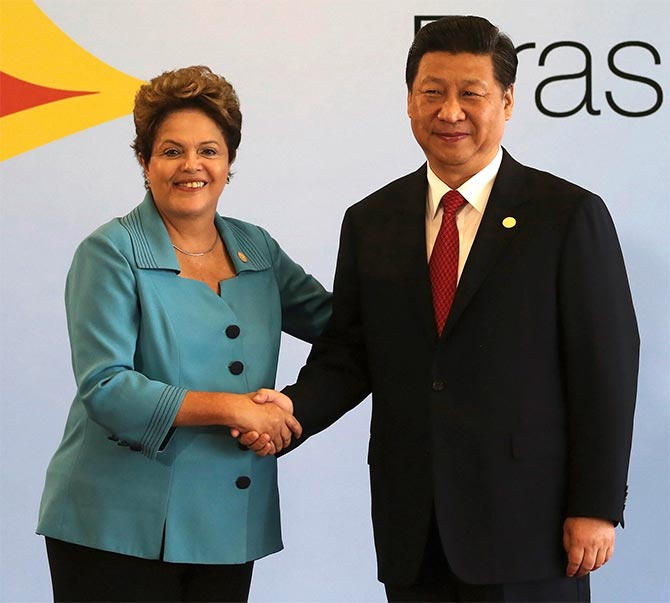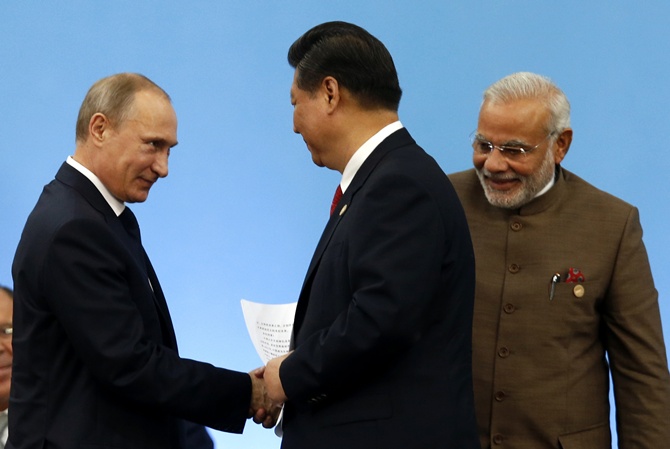Photographs: Paulo Whitaker/Reuters Alonso Soto
Internal discord became evident on Tuesday when the group struggled to overcome a last-minute stalemate in negotiations as China and India vied for the headquarters of the bank.
In two years of tough negotiations to create the new BRICS development bank, the main stumbling block was not a lack of resources or commitment, but fellow partner China.
The Chinese initially wanted a bigger share of the bank that was formally launched on Tuesday by the leaders of the five BRICS countries in a direct challenge to the West's tightly-held grip over global finances, officials involved in talks said.
In the end, Brazil and India prevailed in keeping capital participation equal among members, but fears linger that China, the world's No. 2 economy, could try to assert greater influence over the $100 billion bank to expand its political clout abroad.
"It is inevitable that the Chinese will dominate the new bank," said Riordan Roett, a political scientist at JohnsHopkinsUniversity. "The Chinese don't get involved in these ventures unless they are going to have, not total control, but a significant amount of influence."
Known for their striking differences in economics and politics, the BRICS face the challenge of containing China's drive to control institutions that were supposed to give each partner an equal voice.
…
Please click here for the Complete Coverage of Budget 2014 -15
The biggest challenge for BRICS success? Big brother China
Image: -(L-R) Russian President Vladimir Putin, Indian Prime Minister Narendra Modi, Brazilian President Dilma Rousseff, Chinese President Xi Jinping and South African President Jacob Zuma join their hands at a group photo session during the 6th BRICS summit in Fortaleza.Photographs: Nacho Doce/Reuters
Internal discord became evident on Tuesday when the group struggled to overcome a last-minute stalemate in negotiations as China and India vied for the headquarters of the bank.
To overcome the snag, Brazil withdrew its request for the bank's first presidency in favor of India, a senior official involved in the discussions said.
The bank will be based in Shanghai, China's business hub.
The objective of the bank is to break away from a model that gives little voting rights to emerging economies and perpetuates the dominance of the United States and Europe over the International Monetary Fund and World Bank.
"This is a big challenge for the BRICS. Sometimes when you get down to the actual negotiations and countries want more say, they forget about some of their lofty aspirations when they were criticizing the IMF and World Bank," said Kevin Gallagher, professor of international relations at BostonUniversity.
China already has the largest share of the new reserve fund, also launched on Tuesday and known as the Contingent Reserves Arrangement. It pledged $41 billion while Brazil, Russia and India promised $18 billion each and South Africa $5 billion.
...
The biggest challenge for BRICS success? Big brother China
Image: Brazil's President Dilma Rousseff shakes hands with China's President Xi Jinping before the 6th BRICS summit in Fortaleza.Photographs: Reuters
CHINESE CLOUT
Although China's economy has slowed in recent years, it remains the world's main engine of growth. Brazil, India and Russia have slowed even more sharply since the group's first adopted the BRIC acronym in the past decade. Much-smaller South Africa joined the group in 2010.
China's economy is bigger than that of all the other BRICS combined and represents the bulk of the group's foreign trade.
"It is only natural for China to have more influence at the bank because of the importance of its economy," said Paulo Wrobel, professor at the Pontifical Catholic University of Rio de Janeiro's BRICS Policy Center.
China's economic might has at times put it at odds with some of its own BRICS partners.
An avalanche of Chinese manufactured imports into Brazil over the last three years prompted the South American country to raise trade barriers to keep its manufacturers from going under.
In private, other members have frowned at China's slow-moving liberalization of its currency, the yuan, which makes its exports much cheaper.
…
The biggest challenge for BRICS success? Big brother China
Image: Russia's President Vladimir Putin (L) shakes hands with China's President Xi Jinping as India's Prime Minister Narendra Modi (R) looks on during the VI BRICS Summit in Fortaleza.Photographs: Paulo Whitaker/Reuters
So officials from the other smaller economies have tried to prevent China from growing too powerful in the new institutions. The bank's internal rules seek to prevent any single member from holding too much sway.
"The idea is to have a professional institution ruled by the best banking practices and shared governance that will keep that risk at bay," Luciano Coutinho, head of Brazil's own development bank BNDES, told Reuters on the sidelines of the summit.
The BRICS will hold a minimum stake of 55 percent at the lender, but some analysts say China could increase its hold by bringing in new member countries from its sphere of influence.
However, others argue that is in China's best interest to be a team player - at least for now.
"For China there is interest in making it look like this is not a Chinese dominated bank because that will allow it to finance projects that otherwise it couldn't," said Oliver Stuenkel, a professor at the Getulio Vargas Foundation in Sao Paulo. "The bank is a way to depoliticize Chinese credit."
(Additional reporting by Anthony Boadle; Editing by Todd Benson and Tom Brown)






article